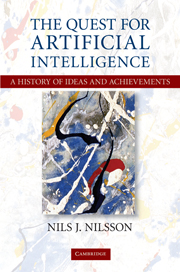Book contents
- Frontmatter
- Contents
- Preface
- PART I BEGINNINGS
- PART II EARLY EXPLORATIONS: 1950S AND 1960S
- PART III EFFLORESCENCE: MID-1960S TO MID-1970S
- 9 Computer Vision
- 10 “Hand-Eye” Research
- 11 Knowledge Representation and Reasoning
- 12 Mobile Robots
- 13 Progress in Natural Language Processing
- 14 Game Playing
- 15 The Dendral Project
- 16 Conferences, Books, and Funding
- PART IV APPLICATIONS AND SPECIALIZATIONS: 1970s TO EARLY 1980s
- PART V “NEW-GENERATION” PROJECT
- PART VI ENTR'ACTE
- PART VII THE GROWING ARMAMENTARIUM: FROM THE 1980s ONWARD
- PART VIII MODERN AI: TODAY AND TOMORROW
- Index
- Plate section
15 - The Dendral Project
Published online by Cambridge University Press: 05 August 2013
- Frontmatter
- Contents
- Preface
- PART I BEGINNINGS
- PART II EARLY EXPLORATIONS: 1950S AND 1960S
- PART III EFFLORESCENCE: MID-1960S TO MID-1970S
- 9 Computer Vision
- 10 “Hand-Eye” Research
- 11 Knowledge Representation and Reasoning
- 12 Mobile Robots
- 13 Progress in Natural Language Processing
- 14 Game Playing
- 15 The Dendral Project
- 16 Conferences, Books, and Funding
- PART IV APPLICATIONS AND SPECIALIZATIONS: 1970s TO EARLY 1980s
- PART V “NEW-GENERATION” PROJECT
- PART VI ENTR'ACTE
- PART VII THE GROWING ARMAMENTARIUM: FROM THE 1980s ONWARD
- PART VIII MODERN AI: TODAY AND TOMORROW
- Index
- Plate section
Summary
After ed feigenbaum moved from uc berkeley to stanford in 1965, he became interested in “creating models of the thinking processes of scientists, especially the processes of empirical induction by which hypotheses and theories were inferred from data.” As he put it, “What I needed was a specific task environment in which to study these issues concretely.” Feigenbaum recalls attending a Behavioral Sciences workshop at Stanford and hearing a talk by Joshua Lederberg (1925–2008; Fig. 15.1), a Nobel Prize–winning geneticist and founder of the Stanford Department of Genetics. Lederberg talked about the problem of discerning the structure of a chemical compound from knowledge of its atomic constituents and from its mass spectrogram. This sounded like the kind of problem Feigenbaum was looking for, and he and Lederberg soon agreed to collaborate on it.
Chemical molecules are described by formulas that give their atomic constituents. For example, the formula for propane is C3H8, indicating that it consists of three carbon atoms and eight hydrogen atoms. But there is more to know about a compound than what atoms it is made of. The atoms composing a molecule are arranged in a geometric structure, and chemists want to know what that structure is. The three carbon atoms in propane, for example, are attached together in a chain. The two carbon atoms at the ends of the chain each have three hydrogen atoms attached to them, and the single carbon atom in the middle of the chain has two hydrogen atoms attached to it.
- Type
- Chapter
- Information
- The Quest for Artificial Intelligence , pp. 197 - 201Publisher: Cambridge University PressPrint publication year: 2009



